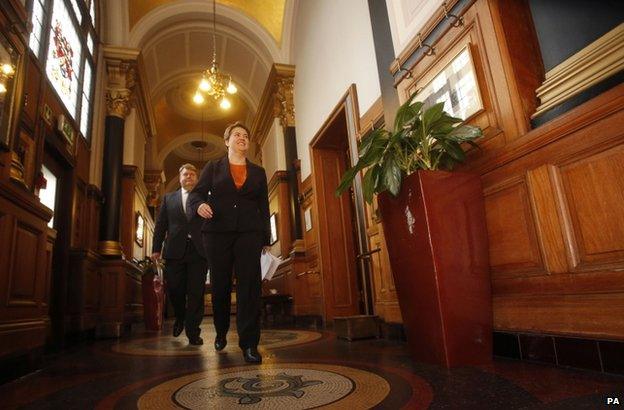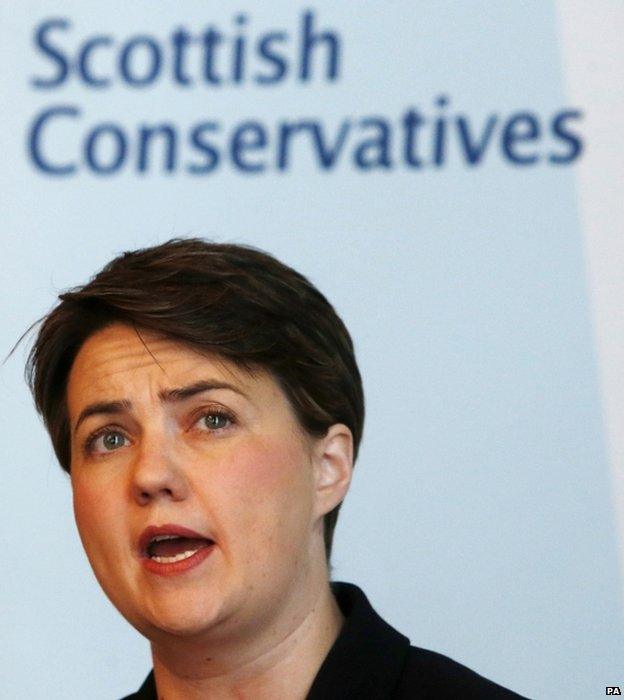Scottish independence: Tories back Scots income tax power
- Published
- comments
Ruth Davidson said MSPs would have to: "think of how money is raised, and from whom, rather than simply how to spend it"
Scotland should be given full income tax powers following a vote against independence, Scottish Conservative leader Ruth Davidson has said.
She also argued Holyrood should get additional responsibility over VAT, income tax and welfare.
The plans, which have been endorsed by Prime Minister David Cameron, will be in the Conservative manifesto for the 2015 UK election.
Scottish ministers said independence was Scotland's only credible option.
Ms Davidson outlined her plans as she published the conclusions of the party's devolution commission, external, chaired by Lord Strathclyde, former leader of the House of Lords.
She said Holyrood - currently funded by a Treasury block grant - must be accountable for raising the money it spends.

Ms Davidson outlined her plans alongside Lord Strathclyde, who chaired the party's devolution commission
The commission, which said the income tax plan would see the Scottish Parliament accountable for 40% of the money it spends, said:
There was a case for a share of Scottish VAT receipts being assigned to the Scottish Parliament.
The tax-free personal income tax allowance should remain reserved to Westminster, but, after that, the Scottish Parliament would decide on rates and bands.
A new, independent Scottish Fiscal Commission should be created to produce Scottish forecasts
The Scottish Parliament should get responsibility on welfare issues which relate to devolved areas, such as housing benefits, and attendance allowance paid to disabled people aged 65 or over who need help with personal care.
Ms Davidson insisted the proposals, which would be offset against a cut in the block grant, were not "some kind of consolation prize" in the event of a "No" vote in the 18 September independence referendum.
She said: "In just 15 weeks, Scotland faces its biggest decision in almost 300 years on whether to remain part of the UK.
"We believe the people of Scotland should have good reasons to be passionate about wanting to remain within this Union.
"That is why it's imperative to offer voters in September a positive vision of how our nation can progress and have a bigger say within the UK."
Ms Davidson said some of the proposals may be "hard to achieve", especially when areas like housing benefit become part of the UK government's Universal Credit.
However, the prime minister described the commission's report as a "clear, coherent and Conservative blueprint for the next stage of Scotland's devolution journey".
"All the mainstream pro-UK parties believe in further devolution, so whilst we would want to build consensus for a set of measures and legislation, there is no reason why these changes shouldn't happen early in the next parliament," Mr Cameron said.
But Scotland's deputy first minister, Nicola Sturgeon, said the Conservatives had a long record of broken promises to Scotland.
"With their package of proposals today, the Tories have demolished a central pillar of the 'No' campaign by recommending ending uniform tax and benefits across UK," she said.
"This is the party that opposed devolution tooth and nail - they broke promises for more powers in the past, and Ruth Davidson was elected leader saying she had drawn 'a line in the sand' against more powers.
"Now they want us to believe they have had a sudden conversion to Scotland's cause."

Ruth Davidson insisted the proposals were not a "consolation prize" in the event of a referendum "No" vote
Scotland's other pro-Union parties have already set out their plans for strengthening devolution.
The Liberal Democrats said, external Holyrood should raise 50% of the money it spends and have control over income, capital gains and inheritance tax.
And Labour's plans, external, included devolving of three quarters of the 20p tax rate and control over housing benefit and more powers for Scotland's islands.
Scotland is due to get some limited powers over income tax in 2016 as a result of the Scotland Act.